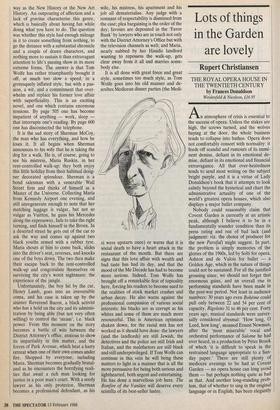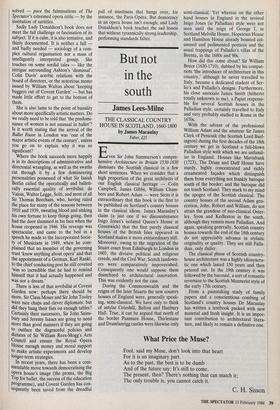Lots of things in the Garden are lovely
Rupert Christiansen
THE ROYAL OPERA HOUSE IN THE TWENTIETH CENTURY by Frances Donaldson
Weidenfeld & Nicolson, L16.95
An atmosphere of crisis is essential to the success of opera. Unless the stakes are high, the screws turned, and the wolves baying at the door, the whole business tends to collapse into bathos. Opera does not comfortably consort with normality: it feeds off scandal and rumours of its immi- nent demise, defiant in its emotional de- mise, defiant in its emotional and financial. extravagance. All that over-heatedness tends to send most writing on the subject bright purple, and it is a virtue of Lady Donaldson's book that it attempts to look calmly beyond the hysterical and chart the administrative actuality of one of the world's greatest opera houses, which also displays a major ballet company. Nobody could reasonably claim that Covent Garden is currently at an artistic peak, although I believe it to be in a fundamentally sounder condition than its press rating and run of bad luck (and judgment: viz. the choice of producer for the new Parsifal) might suggest. In part, the problem is simply memories of the glories of the 1960s, led by Solti for opera, Ashton and de Valois for ballet — a Golden Age, which in the nature of things could not be sustained. For all the justified grousing since, we should not forget that enormous gains, and an overall rise in performing standards have been made in the post-war period. Not least in audience numbers: 30 years ago even Boheme cola(' pull only between 22 and 54 per cent of capacity, Rigoletto 31 to 46 per cent. Forty years ago, musical standards were univer- sally considered abysmal: 'How long, 0 Lord, how long', moaned Ernest Newman, after the 'most miserable' vocal and orchestral performance of Salome he had ever heard, in a production by Peter Brook of which 'it is difficult to speak in the restrained language appropriate to a Sun- day paper.' There are still plenty of mediocre evenings to be had at Covent Garden — no opera house can long avoid them — but perhaps nothing quite as bad as that. And another long-standing prob- lem, that of whether to sing in the original language or in English, has been elegantly solved — pace the fulminations of The Spectator's esteemed opera critic — by the institution of surtitles.
Sadly Lady Donaldson's book does not meet the full challenge or fascination of its subject. If it is calm, it is also tentative, and thinly documented. It is neither a full and badly needed — sociology of a com- plex cultural organisation nor a mass of intelligently interpreted gossip. She touches on some sordid tales — like the intrigue surrounding Ashton's 'dismissal', Colin Davis' acerbic relations with the board of directors, or the notorious memo issued by William Walton about 'keeping buggers out of Covent Garden' — but has made little effort to get to the bottom of them.
She is also lame to the point of banality about more specifically artistic matters. Do we really need to be told that 'the predomi- nance of women is not unusual in ballet'? Is it worth stating that the arrival of the Ballet Russe in London was 'one of the major artistic events of the century', unless you go on to explain why it was so significant?
Where the book succeeds more happily is in its descriptions of administrative and directorial wrangling, as well as the swaths cut through it by a few domineering personalities possessed of what Sir Isaiah Berlin called the operatically and balleti- cally essential quality of terribilitch de Valois, Walter Legge, Solti, and most of all Sir Thomas Beecham, who, having ruled the place for many of the seasons between 1910 and 1939, sweating blood and sinking his own fortune to keep things going, then had the door slammed in his face when the house reopened in 1946. His revenge was spectacular, and came to the boil in a speech he made to the Incorporated Socie- ty of Musicians in 1949, when he com- plained that no member of the governing trust 'knew anything about opera' and that the appointment of a German, Karl Rankl, to the chief conducting post he still coveted `was so incredible that he had to remind himself that it had actually happened and was not a dream.'
There is less of that terribilita at Covent Garden now: perhaps there should be more. Sir Claus Moser and Sir John Tooley were nice chaps and clever diplomats: but did they bang their fists on enough tables? Certainly their successors, Sir John Sains- bury and Jeremy Isaacs are going to need more than good manners if they are going to outface the disgraceful policies and dictates of Sir William Rees-Mogg's Arts Council and ensure the Royal Opera House enough money and moral support to make artistic experiments and develop longer-term strategies. In recent years, there has been a com- mendable move towards democratising the opera house's image (the proms, the Big Top for ballet, the success of the education programme), and Covent Garden has con- sequently been saved from the dreadful pall of mustiness that hangs over, for instance, the Paris Opdra. But democracy in an opera house isn't enough; and Lady Donaldson's book teaches the sad lesson that without tyrannically strong leadership, performing standards falter.



























































 Previous page
Previous page